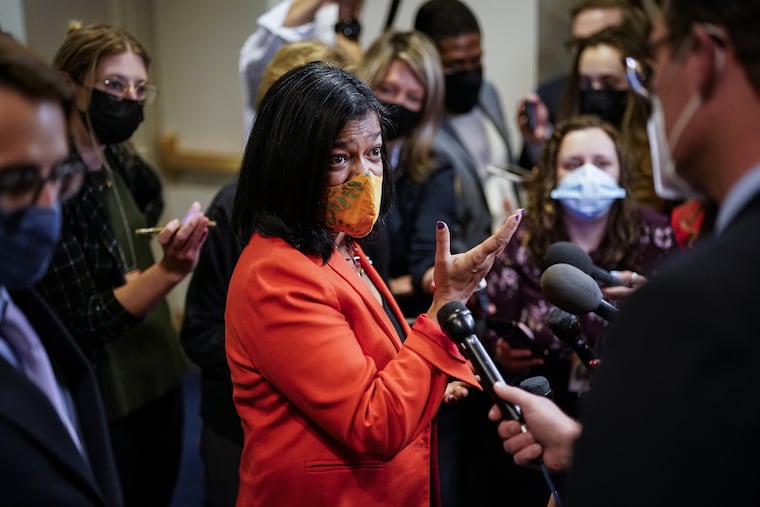Democrats begin narrowing their differences on Biden’s agenda bill
Liberals are signaling sizable concessions on the size of what could be the most far-reaching social legislation in years.

Democrats in a flurry of private talks are beginning to narrow their differences over the size of President Joe Biden’s sweeping safety-net bill, as liberals signal sizable concessions on the size of what could be the most far-reaching social legislation in years.
In a virtual meeting with about a dozen liberal Democrats on Monday, Biden suggested a range of $1.9 trillion to $2.2 trillion, according to people with knowledge of the private discussion - significantly lower than his initial $3.5 trillion plan.
Rep. Pramila Jayapal, D-Wash., leader of the influential Congressional Progressive Caucus, pushed back, according to three of the people, who spoke on the condition of anonymity to discuss internal deliberations. She countered with a minimum spending amount of $2.5 trillion, saying a range from that figure to $2.9 trillion could cover key programs.
Still, the gap between the $2.2 trillion maximum offered by Biden and the $2.5 trillion minimum suggested by Jayapal represents a striking narrowing of differences from just last week.
It is unclear whether Democratic centrists like Sens. Joe Manchin III of West Virginia and Kyrsten Sinema of Arizona would agree to a figure in this range, but Biden has been in frequent contact with them in recent days and has suggested he knows what they would accept.
Meanwhile, other influential progressives such as Sens. Bernie Sanders, I-Vt., have continued to lobby for the $3.5 trillion figure.
Jayapal told Biden in the closed-door meeting that House liberals want a number that closer to $3 trillion, one of the people said, feeling that even that figure was a major compromise from their initial goals.
The back-and-forth between the White House and the most powerful ideological bloc among House Democrats marks a new phase in the talks after last week's failed efforts to pass a separate, bipartisan infrastructure bill embraced by the party's centrists.
» READ MORE: ‘Everybody is frustrated,’ Biden says as his agenda is held up in Congress
It suggests that figures across the party are accepting that the social spending bill will be packaged with the bipartisan infrastructure bill, and that the challenge now is how to scale it back to a something closer to $2 trillion.
The $1.9 trillion to $2.2 trillion range has been viewed as a target that could be acceptable to Manchin and Sinema, the two powerful holdout Democratic senators from the party's moderate wing.
Manchin has stressed in public that he does not want to spend more than $1.5 trillion, citing the potential impact on the nation's debt, despite Biden's assurances that the bill is paid for. Sinema, who has been negotiating directly with the White House, has declined to publicly telegraph her demands.
In a statement, Jayapal called Monday's meeting "very productive" and added, "Progressives fought to get the full Biden agenda back on track, and now we are beginning negotiations to deliver it to working people, families, and our communities."
Biden this week is waging a simultaneously public and private effort to push his two major bills, on infrastructure and social programs, across the finish line on Capitol Hill.
He is scheduled to speak later Tuesday at a union hall in Howell, Mich., a battleground area won narrowly by President Donald Trump but currently represented by a centrist Democrat, Rep. Elissa Slotkin. Biden's travel strategy is guided in part by a desire to show his plans are popular even in areas represented by at-risk Democrats, according to a White House official.
At Monday's virtual meeting, Jayapal also advocated the notion of keeping all the major elements of the safety net plan but letting some expire sooner to cut costs, according to two people with knowledge of the discussion.
Some Democrats are betting that if popular programs like free community college or universal prekindergarten care are passed and then expire, it will be relatively easy to extend them, since any effort to take away such everyday benefits would be unpopular.
Biden, who spoke by phone with members of Congress over the weekend, plans to huddle virtually with House moderates later Tuesday. He is diving deeper into the talks with members and is broadening the universe of members he is talking to, the White House official said.
The Washington Post’s Tyler Pager contributed to this report.